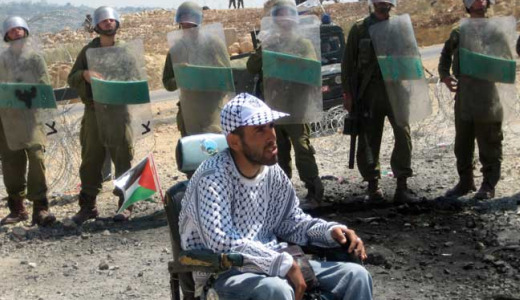 |
| Scene at a 2008 protest in Bil'in.(Friends of Freedeom and Justice Bilin) |
|
A meeting between Israeli and Palestinian Communist leaders last
month highlighted a new approach that is gaining favor among
Palestinians as the path to achieving a state of their own alongside
Israel.
"Depending on the sole option of negotiations has exhausted its
purposes," leaders of the Palestinian People's Party and the Israeli
Communist Party said March 25, following a meeting in the West Bank
city of Ramallah, "and ... it is necessary now to activate and develop
other strong factors in the Palestinian position."
Fed up with the increasingly aggressive Israeli far-right and
frustrated with U.S. hesitancy to confront it, Palestinian leaders of
varied political views are emphasizing nonviolent mass action by the
Palestinian people to push back against Israeli settlement
encroachments and the occupation's repressive measures.
The aim, they say, is twofold: to arouse the world community to
press Israel to end its occupation, and simultaneously to create "facts
on the ground" that will make a Palestinian state an inevitable and
speedy reality.
This approach, called "sumud" (steadfastness), was highlighted by
Palestinian Prime Minister Salam Fayyad last month, when he joined
residents in planting trees in a village near the West Bank city of
Qalqilya, where the Israeli separation wall surrounds the city and
blocks farmers' access to their land. Fayyad told about 1,000 people gathered to hear him, "This is our real project, to establish our presence on our land and keep our people on it."
"Steadfastness must be translated from a slogan to acts and facts on the ground," he said.
In a recent interview with Asharq al-Awsat,
Fayyad said his approach "is based on the peaceful daily expression, in
a non-violent manner, of opposition to occupation and settlements,
boycotting the products of the settlements and invigorating the popular
movement against the wall." Such a movement, he said, should be matched
by stepped up international involvement "to strip away legitimacy from
everything that has any connection to the Israeli colonialist scheme."
Resistance and intifada (uprising) should not be defined narrowly as
armed actions, Fayyad said. "The entire Palestinian people today are in
an intifida peacefully in resisting the settlements, the wall and the
occupation. If this resistance does not meet the specifications of some
[it is because] it does not have boys who are killed."
"I am not ashamed to say that I am against sending children to the
barricades so that they would be slaughtered for the sake of issuing a
statement," he said. "Resistance without blood is also resistance."
Last week, Rajmohan Gandhi, grandson of Indian independence leader
Mahatma Gandhi, visited Bil'in, a West Bank village slashed by the
Israeli wall, whose residents have become international symbols of the
Palestinian nonviolent resistance movement, holding weekly protests
against the wall since 2005. The movement has spread to other
Palestinian villages. "What happens in the village is a model for
contemporary nonviolent popular resistance," Gandhi said during his
visit. By awakening the conscience of the world community, this
movement, he said, will spur an end to the "persecution and occupation"
of the Palestinian people, and the Israeli settlements and separation
wall "will disappear."
On April 14, Martin Luther King III is scheduled to speak at a
conference on nonviolence in Ramallah, sponsored by Realizing the
Dream, a group founded by King and his mother Coretta Scott King, and
two Jerusalem-based organizations: Middle East Non-Violence and Democracy and the Center for Democracy and Community Development. The event's objective,
the sponsors say, is to bring together, strengthen and enlarge
Palestinian nonviolence efforts in order to end the occupation.
Israeli peace advocates are joining with Palestinians in many of
these efforts. On March 6, several thousand Israelis and Palestinians
demonstrated in East Jerusalem's Sheikh Jarrah neighborhood against
Israeli authorities' eviction of Palestinians from their homes to
accommodate Jewish settlers. The event drew wide international media coverage.
The Palestinian People's Party and Israeli Communist Party leaders
emphasized the need for "escalation of popular struggle and resistance"
among the Palestinian people and for activating the "peace moves in the
Israeli street that opposes occupation, settlements and provocations in
Occupied East Jerusalem, just like what happened in Sheikh Jarrah
recently." They pointed to "the adamant popular resistance against the
Apartheid Wall in Bil'in and Ni'lin, which has become a unique model
and symbol of the struggle."
At the same time, they stressed the need for "comprehensive
political moves at the international level" to push Israel to stop
settlement construction, abide by international laws and United Nations
resolutions, and end the occupation.
Their statement gives their views on a range of pressing issues,
including Israeli-Palestinian negotiations, the U.S. role, the East
Jerusalem settlement crisis, Gaza, the demand for Palestinians to
recognize Israel as a Jewish state, democratic struggles within Israel,
and the splits within the Palestinian movement. It is available in
English on the Israeli Communist Party web site.
People's World

